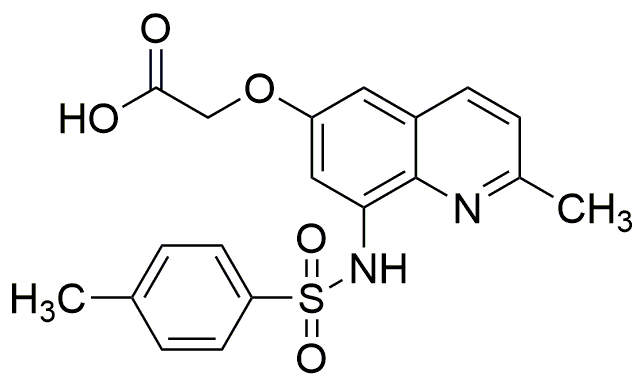Zinquin is widely utilized in research focused on:
- Fluorescent Probes: It serves as a highly effective fluorescent probe for detecting zinc ions in biological systems, helping researchers study zinc's role in cellular processes.
- Cell Imaging: Zinquin is used in live-cell imaging applications, allowing scientists to visualize zinc dynamics in real-time, which is crucial for understanding various physiological and pathological conditions.
- Neuroscience Research: This compound is instrumental in neuroscience studies, particularly in exploring zinc's involvement in neurotransmission and its implications in neurodegenerative diseases.
- Drug Development: Zinquin's ability to selectively bind zinc makes it valuable in drug formulation processes, particularly for developing therapeutics targeting zinc-related pathways.
- Environmental Monitoring: It is applied in environmental science to assess zinc levels in ecosystems, aiding in the evaluation of pollution and its effects on wildlife.
General Information
Properties
Safety and Regulations
Applications
Zinquin is widely utilized in research focused on:
- Fluorescent Probes: It serves as a highly effective fluorescent probe for detecting zinc ions in biological systems, helping researchers study zinc's role in cellular processes.
- Cell Imaging: Zinquin is used in live-cell imaging applications, allowing scientists to visualize zinc dynamics in real-time, which is crucial for understanding various physiological and pathological conditions.
- Neuroscience Research: This compound is instrumental in neuroscience studies, particularly in exploring zinc's involvement in neurotransmission and its implications in neurodegenerative diseases.
- Drug Development: Zinquin's ability to selectively bind zinc makes it valuable in drug formulation processes, particularly for developing therapeutics targeting zinc-related pathways.
- Environmental Monitoring: It is applied in environmental science to assess zinc levels in ecosystems, aiding in the evaluation of pollution and its effects on wildlife.
Documents
Safety Data Sheets (SDS)
The SDS provides comprehensive safety information on handling, storage, and disposal of the product.
Product Specification (PS)
The PS provides a comprehensive breakdown of the product’s properties, including chemical composition, physical state, purity, and storage requirements. It also details acceptable quality ranges and the product's intended applications.
Certificates of Analysis (COA)
Search for Certificates of Analysis (COA) by entering the products Lot Number. Lot and Batch Numbers can be found on a product’s label following the words ‘Lot’ or ‘Batch’.
*Catalog Number
*Lot Number
Certificates Of Origin (COO)
This COO confirms the country where the product was manufactured, and also details the materials and components used in it and whether it is derived from natural, synthetic, or other specific sources. This certificate may be required for customs, trade, and regulatory compliance.
*Catalog Number
*Lot Number
Safety Data Sheets (SDS)
The SDS provides comprehensive safety information on handling, storage, and disposal of the product.
DownloadProduct Specification (PS)
The PS provides a comprehensive breakdown of the product’s properties, including chemical composition, physical state, purity, and storage requirements. It also details acceptable quality ranges and the product's intended applications.
DownloadCertificates of Analysis (COA)
Search for Certificates of Analysis (COA) by entering the products Lot Number. Lot and Batch Numbers can be found on a product’s label following the words ‘Lot’ or ‘Batch’.
*Catalog Number
*Lot Number
Certificates Of Origin (COO)
This COO confirms the country where the product was manufactured, and also details the materials and components used in it and whether it is derived from natural, synthetic, or other specific sources. This certificate may be required for customs, trade, and regulatory compliance.


